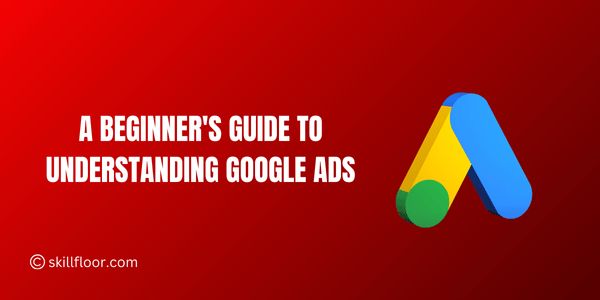A beginner's guide to understanding Google Ads
Learn the essentials of Google Ads with our beginner's guide. Explore key concepts, tips, and strategies to boost your online advertising success

Google Ads, formerly known as Google AdWords, is a powerful digital advertising platform that has transformed the way businesses promote their products and services online. Whether you're a small local business or a global e-commerce giant, understanding how Google Ads works can be a game-changer for your online presence. This beginner's guide aims to demystify Google Ads, walking you through the basics, setting up your first campaign, and providing essential tips and strategies to help you succeed in the world of online advertising. By the end of this guide, you'll have a solid foundation to harness the potential of Google Ads for your business.
What Are Google Ads?
Google Ads, formerly known as Google AdWords, is an online advertising platform developed and operated by Google. It's a powerful and widely-used digital advertising tool that enables businesses and marketers to promote their products or services to a vast online audience. Google Ads allows advertisers to create and manage advertisements that appear on Google's search engine results pages, as well as on other Google-owned platforms and a network of partner websites.
The core principle of Google Ads revolves around pay-per-click (PPC) advertising, where advertisers bid on specific keywords or target audiences, and they pay a fee only when their ads are clicked. This approach ensures that advertisers can reach potential customers actively searching for products or services related to their offerings, making it a highly efficient and cost-effective method of digital marketing.
Getting Started with Google Ads
Setting Up Your Google Ads Account
When embarking on your journey into the world of Google Ads, the first step is to set up your Google Ads account. Fortunately, this process is relatively straightforward. You'll need a Google account to get started. If you already have one, you can simply log in to Google Ads using your existing credentials. If not, you'll need to create a Google account.
Understanding Google Ads Lingo
As you dive deeper into the world of Google Ads, you'll encounter a unique set of terms and acronyms that are essential for understanding and managing your campaigns effectively. Here are a few key terms you should familiarize yourself with:
-
Impressions: This refers to the number of times your ad is displayed to users. It doesn't necessarily mean the user interacted with the ad; it's simply a measure of how often it's shown.
-
Clicks: Clicks represent the number of times users click on your ad. This is a crucial metric as it directly relates to the performance of your campaign.
-
CTR (Click-Through Rate): CTR is calculated by dividing the number of clicks by the number of impressions. It helps you gauge the effectiveness of your ad in encouraging users to take action.
-
Keywords: These are the words or phrases that trigger your ads to appear when users search on Google. Selecting the right keywords is vital for reaching your target audience.
-
Ad Groups: Ad groups are collections of related ads and keywords within your campaign. They help you organize your advertising efforts and maintain relevance in your messaging.
-
Quality Score: Quality Score is a Google-assigned rating that measures the quality and relevance of your ads, keywords, and landing pages. It directly impacts your ad position and cost-per-click.
-
Conversion: A conversion occurs when a user takes a desired action after clicking on your ad, such as making a purchase, filling out a form, or signing up for a newsletter.
-
Ad Extensions: These are additional pieces of information that can be added to your ads to provide more context and encourage user engagement. Examples include call extensions, site link extensions, and location extensions.
Keyword Research and Selection
The Role of Keywords
Keywords are the foundation of your Google Ads campaign. They are the words and phrases that people use when searching for products or services online. Choosing the right keywords is crucial because they determine when and where your ads will appear. Effective keyword selection ensures your ads are shown to a relevant audience, increasing the chances of conversions.
Conducting Keyword Research
Keyword research involves identifying the terms and phrases potential customers use to find products or services similar to yours. Tools like the Google Keyword Planner can help you discover relevant keywords and their search volumes. It's essential to strike a balance between high search volume keywords and those with less competition to optimize your campaign's performance.
Building Keyword Lists
After conducting keyword research, compile a comprehensive list of relevant keywords that align with your business goals. Group similar keywords into ad groups to maintain relevance and improve ad quality. Regularly update and refine your keyword lists to adapt to changing market trends and customer behavior. Keyword lists are dynamic and play a significant role in your campaign's success.
Creating Effective Ad Campaigns
Setting Campaign Objectives: When creating an effective ad campaign, it's crucial to start by defining clear objectives. Ask yourself what you want to achieve with your campaign. Are you looking to drive website traffic, generate leads, increase sales, or raise brand awareness? Setting specific goals will guide your campaign strategy and measurement of success.
Ad Campaign Settings: Properly configuring campaign settings is vital for success. These settings include budget allocation, ad scheduling, location targeting, and device preferences. Your choices here will impact when and where your ads appear, ensuring they reach the right audience at the right time.
Ad Extensions: Ad extensions are additional pieces of information that enhance your ads, providing users with more reasons to click. They can include site links, callout extensions, location extensions, and more. Utilizing ad extensions can increase your ad's visibility, improve click-through rates, and drive more qualified traffic to your website.
Writing Compelling Ads
-
Crafting Attention-Grabbing Headlines: The headline of your ad is the first thing users see, so make it count. Use concise, impactful language that relates to your keywords and offers a clear benefit to the audience. A compelling headline piques curiosity and entices clicks.
-
Writing Persuasive Ad Copy: The body of your ad should provide more context and convince users to take action. Highlight unique selling points, benefits, and a clear call to action (CTA). Use persuasive language that addresses the user's needs or pain points.
-
Utilizing Ad Extensions for Additional Information: Ad extensions are valuable real estate to provide more information. Use site link extensions for additional landing page options, callout extensions to highlight special offers, and structured snippets to showcase product/service features. These extensions enhance ad visibility and user engagement.
-
Ad Copy Best Practices: Keep your ad copy concise and to the point. Use adjectives sparingly but strategically to convey value. Incorporate keywords naturally and ensure alignment between the ad and the landing page to maintain relevance. Regularly test and refine your ad copy to optimize performance.
Budgeting and Bidding Strategies
In the section on "Budgeting and Bidding Strategies," we delve into the financial aspects of running Google Ads campaigns. First, we demystify the pricing structure of Google Ads, helping beginners comprehend how they are charged for their advertising efforts. Next, we guide you through the process of setting both daily and monthly budgets, ensuring you maintain control over your spending.
One critical decision in managing your campaigns is choosing between manual and automated bidding. We explain the pros and cons of each approach, helping you decide which one aligns better with your campaign objectives and expertise level. Additionally, we outline various bid strategies tailored to different campaign goals, providing valuable insights into optimizing your bids for maximum effectiveness and return on investment. Mastering budgeting and bidding is essential to achieving success with Google Ads, making this section a pivotal aspect of your journey to becoming proficient in online advertising.
Monitoring and Optimizing Your Campaigns
In the crucial phase of monitoring and optimizing your Google Ads campaign, you'll delve into tracking conversions to measure the effectiveness of your efforts. Analyzing performance metrics provides valuable insights into what's working and what needs improvement. Armed with data-driven decisions, you'll embark on a journey of continuous optimization, ensuring that your campaign evolves to achieve its objectives efficiently. This phase is where the true potential of your Google Ads campaign is unlocked, allowing you to refine your strategies and drive better results for your business.
Ad Policies and Compliance
Ensuring that your Google Ads campaign complies with Google's policies and guidelines is crucial to its success and longevity. Google has strict rules in place to maintain the integrity of its advertising ecosystem and protect users. These policies cover various aspects of your ads, including content, targeting, and user experience.
When creating your ads, it's essential to:
-
Adhere to Content Policies: Make sure your ad content is accurate, non-misleading, and does not promote harmful or prohibited products or services. Avoid using copyrighted material without permission.
-
Respect Trademarks: Be cautious about using trademarks in your ads, as Google has specific rules regarding trademark usage. Ensure that you have the necessary permissions or qualifications to use them.
-
Avoid Prohibited Practices: Google prohibits certain practices, such as deceptive advertising, promoting illegal activities, or using misleading tactics. Familiarize yourself with these rules to prevent ad disapproval.
-
Maintain Transparency: Clearly state any terms, conditions, or fees associated with your products or services in your ads. Misleading or hidden information can lead to ad disapproval.
-
Follow User Experience Guidelines: Ensure that your landing pages provide a positive user experience and load quickly. Non-functional or misleading landing pages can lead to penalties.
-
Respect Privacy and Data Usage: Be mindful of how you collect and use user data, especially for personalized ads. Comply with privacy regulations and provide transparency to users.
Beyond Google Search: Display and Video Ads
-
Expanding Your Reach with Display Ads: Display ads offer a visually engaging way to reach a broader audience. These image or text-based ads appear on websites within Google's Display Network. Learn how to leverage this powerful tool to increase brand visibility and drive traffic to your website.
-
Video Advertising on YouTube: YouTube is the second-largest search engine globally, making it a prime platform for video advertising. Explore the world of video ads, understand ad formats, and discover how to create compelling video campaigns that resonate with your target audience.
-
Creating Engaging Display and Video Campaigns: Crafting effective display and video campaigns requires a different approach than search ads. Dive into the creative aspects, such as designing eye-catching visuals, writing compelling ad copy, and using targeting options effectively to deliver impactful display and video advertising campaigns.
Google Ads is a potent tool for businesses to reach their target audience and achieve marketing goals. It offers a dynamic platform for advertising, but success requires continuous learning and optimization. As you delve into the world of Google Ads, remember that it's an ongoing journey of refinement and adaptation to changing trends and consumer behavior. To further enhance your expertise, explore additional resources and stay up-to-date with the latest developments in the world of online advertising. With dedication and strategic implementation, Google Ads can be a game-changer for your business, driving growth and success in the digital marketplace.































































